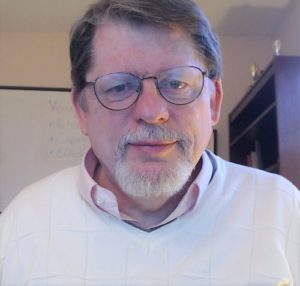 BWW member John Maxwell has not published any books yet. He is working on a young adult fiction story about a troubled boy who encounters an old wise man who agrees to take him down river in a canoe so the boy can reach his ailing mother. John is also working on a non-fiction book that shares the lessons he’s learned as a sales training mentor to small business owners. In this interview he shares his thoughts on the unromantic parts of being a not-yet published writer.
BWW member John Maxwell has not published any books yet. He is working on a young adult fiction story about a troubled boy who encounters an old wise man who agrees to take him down river in a canoe so the boy can reach his ailing mother. John is also working on a non-fiction book that shares the lessons he’s learned as a sales training mentor to small business owners. In this interview he shares his thoughts on the unromantic parts of being a not-yet published writer.
How often do you stare at a blank screen and produce nothing worthwhile?
It happens frequently. Too often I sit down with the intention to write and I have nothing in my head. Sometimes I’d just jump into it and write a few paragraphs. Then I read it and decide that what I have written is crap and I just delete it. I know the formula to break this is to change my surroundings or immerse myself in other creative work. When my brain is re-stimulated, the content can begin to flow again.
Have you ever written a serious piece of work and had people interpret it as humor?
Yes. I remember when I wrote a story about my experience at the Chicago Marathon. The first half of the story is light-hearted, and the second half is dark. It was dark because my body was breaking down in the latter half of the race. Most of the readers asked me to make the second half funny like the first. It was an account of what really happened, so the second half needed to be painful and dark.
Has the effortless outpouring of perfect words ever happened to you?
I have had numerous poems simply pour out of me effortlessly. The hardest thing to write is poetry. Without inspiration it’s almost impossible. I’ve dictated content into my phone while still in bed. Sometimes my wife does not appreciate the creative process.
In your fiction book the young boy learns many lessons from the old man. What does the old man learn from the boy?
The old man has lived his life. He made unwise choices regarding his close relationships. He put scar tissue over those wounds. In their conversations the young boy has naïve eyes and sees the old man’s struggles as the old man no longer can. The young boy calls out what he sees in the simplest terms. It is a reminder for the old man. Will he come to terms with it or bury those things? It is an important part of the story.
Why is this story important to you?
I wish I had the benefit of these lessons when I was a young boy. I also wish that as a young boy I had the sense to hear them. In many ways this book is a conversation with my 13-year-old self.
Who is your favorite superhero?
Batman. Because he doesn’t possess superhuman powers. He is brave and clever. He is creative and funny. He is amazingly powerful, yet he cannot fly. Perhaps we can all be Batman(woman) once in a while.
What do you most look forward to at a BWW manuscript critique meeting?
I look forward to what the readers discover in my work. I enjoy praise, I value thoughtful criticism. The feedback has made my works better and has made me a better writer. I most enjoy the experience of seeing the work through their eyes. I have often been surprised that the readers saw things I had missed. They had powerful interpretations that I did not “consciously” intend. They also hear in the work the voice of the author (me) speaking between the lines. They see me. That is an exciting discovery every time.
For your non-fiction book how do you explain sales training to someone who’s never been trained in sales?
I think we complicate sales and selling. It’s really about three things. First, it is about our ability to build authentic trusting relationships. Second, it is about our ability to listen, completely and fully with our entire body. Third, in sales, you must become the master of your emotions. You will see the world clearly, make rational choices, sell more effectively, help others, and enjoy life more.
What will it take for you to finish the two books you are working on?
Focus. Work on it every day, no exceptions. Listen to the “inspirational music” of the book. When the work inspires me, my energy is boundless. When I stop hearing the music, I know the reader will not hear it either. Get feedback from good writers who care about the work.
Do you think publishing a book will change you in some way? If so, how?
I think publishing will be an anti-climax. It is the writing process that has the greatest effect on me. It will be wonderful to share with many people these thoughts that only seem to live inside my head and on my word processor. Perhaps something I write will change the world. That would be nice.
